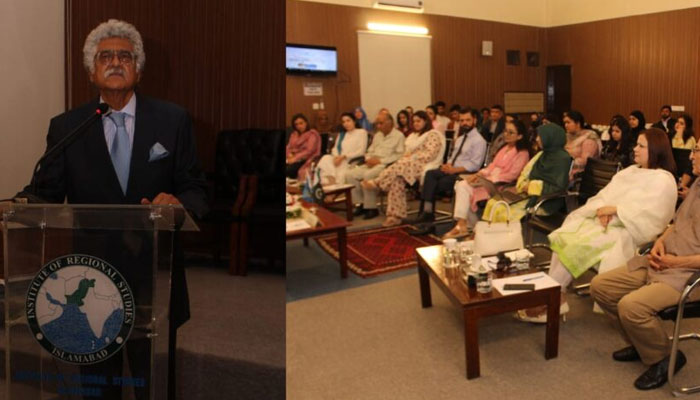‘Pakistan committed to maintain strong deterrence’
Islamabad:Zamir Akram, advisor to the Strategic Plans Division, has said that Pakistan's commitment to maintaining the credibility of a strong deterrence is very important.
Mr Akram was participating in a discussion organised here by Institute of Regional Studies (IRS). Highlighting the evolving nature of deterrence in view of advancing technologies, Mr Akram underscored the need to preserve deterrence credibility to enduring peace. Reflecting on the genesis of conflicts between India and Pakistan, he emphasised that the territorial disputes stemmed from India's pursuit of hegemonic policies since 1947. Consequently, Pakistan's pursuit of security was primarily motivated as a response to India's aggressive ambitions.
He contended that Pakistan's acquisition of nuclear capability was essential to counter India's conventional dominance and establish a credible deterrent which had effectively kept New Delhi from waging war on several occasions in the past.
Speaking on the occasion, Jauhar Saleem, President, IRS, expressed concern that India's development and acquisition of advanced weapons was contributing to an arms race and eroding the essential strategic stability required for peace in South Asia. He warned that India's ultra-nationalistic approach was aggravating mistrust among the nuclear states with negative repercussions for the fragile strategic environment obtaining in the region.
Answering a question on Indo-US cooperation, Mr Akram noted that India — leveraging US cooperation — was adopting a more aggressive stance, as was evident by Balakot incident and revocation of Articles 370 and 35 A in the Occupied Kashmir, while pretending to be a net security provider in the region. He noted that it was in response to India’s belligerent approach that Pakistan was forced to adopt a Full Spectrum Deterrence (FSD) to ensure credibility of deterrence between the two states.
Mr Akram also stressed the importance of avoiding miscalculations in a sensitive security environment in South Asia and reiterated Pakistan's dedication to maintaining credible deterrence essential for upholding peace in the region, which necessitates embracing education in science and technology to stay abreast of the latest advancements in technology.
-
 Gabourey Sidibe Gets Candid About Balancing Motherhood And Career
Gabourey Sidibe Gets Candid About Balancing Motherhood And Career -
 Katherine Schwarzenegger Shares Sweet Detail From Early Romance Days With Chris Pratt
Katherine Schwarzenegger Shares Sweet Detail From Early Romance Days With Chris Pratt -
 Jennifer Hudson Gets Candid About Kelly Clarkson Calling It Day From Her Show
Jennifer Hudson Gets Candid About Kelly Clarkson Calling It Day From Her Show -
 Princess Diana, Sarah Ferguson Intense Rivalry Laid Bare
Princess Diana, Sarah Ferguson Intense Rivalry Laid Bare -
 Shamed Andrew Was With Jeffrey Epstein Night Of Virginia Giuffre Assault
Shamed Andrew Was With Jeffrey Epstein Night Of Virginia Giuffre Assault -
 Shamed Andrew’s Finances Predicted As King ‘will Not Leave Him Alone’
Shamed Andrew’s Finances Predicted As King ‘will Not Leave Him Alone’ -
 Expert Reveals Sarah Ferguson’s Tendencies After Reckless Behavior Over Eugenie ‘comes Home To Roost’
Expert Reveals Sarah Ferguson’s Tendencies After Reckless Behavior Over Eugenie ‘comes Home To Roost’ -
 Bad Bunny Faces Major Rumour About Personal Life Ahead Of Super Bowl Performance
Bad Bunny Faces Major Rumour About Personal Life Ahead Of Super Bowl Performance -
 Sarah Ferguson’s Links To Jeffrey Epstein Get More Entangled As Expert Talks Of A Testimony Call
Sarah Ferguson’s Links To Jeffrey Epstein Get More Entangled As Expert Talks Of A Testimony Call -
 France Opens Probe Against Former Minister Lang After Epstein File Dump
France Opens Probe Against Former Minister Lang After Epstein File Dump -
 Last Part Of Lil Jon Statement On Son's Death Melts Hearts, Police Suggest Mental Health Issues
Last Part Of Lil Jon Statement On Son's Death Melts Hearts, Police Suggest Mental Health Issues -
 Leonardo DiCaprio's Girlfriend Vittoria Ceretti Given 'greatest Honor Of Her Life'
Leonardo DiCaprio's Girlfriend Vittoria Ceretti Given 'greatest Honor Of Her Life' -
 Beatrice, Eugenie’s Reaction Comes Out After Epstein Files Expose Their Personal Lives Even More
Beatrice, Eugenie’s Reaction Comes Out After Epstein Files Expose Their Personal Lives Even More -
 Will Smith Couldn't Make This Dog Part Of His Family: Here's Why
Will Smith Couldn't Make This Dog Part Of His Family: Here's Why -
 Kylie Jenner In Full Nesting Mode With Timothee Chalamet: ‘Pregnancy No Surprise Now’
Kylie Jenner In Full Nesting Mode With Timothee Chalamet: ‘Pregnancy No Surprise Now’ -
 Laura Dern Reflects On Being Rejected Due To Something She Can't Help
Laura Dern Reflects On Being Rejected Due To Something She Can't Help




